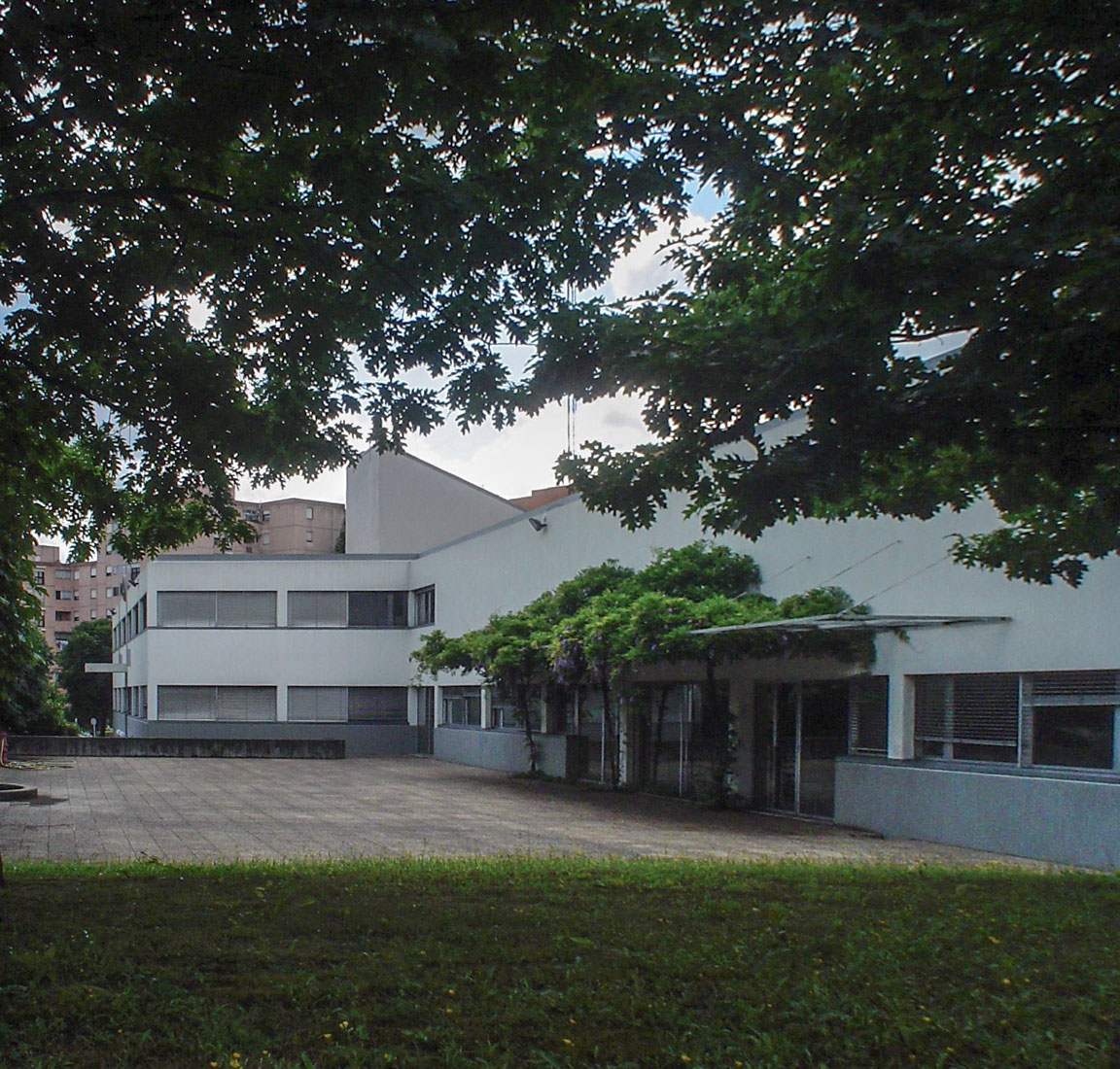 |
 |
 |
 |

Police Station
Avenida Dr. Alfredo Pimenta, Guimarães
1988 - 1993
The
renowned architect Fernando Távora was able to plan and build a new
police station in the Portuguese town of Guimarães between 1988 and
1993. It is a building with a comprehensive program of about 100 rooms.
At the disposal was a polygonal plot with an area of approx. 5500
square meters. At the top of Avenida Dr. Alfredo Pimenta, it is an
exceptional plot with a steeply sloping south oriented topography. The
two-storey building is divided into two components in plan. A square
main building refers to the axis of the avenue, an elongated,
rectangular volume develops in an easterly direction. The entire area
is surrounded by a fair-faced concrete wall. Directly in front of the
square building is a courtyard as the main entrance. A concrete gate in the enclosure wall is aligned axially with the main
entrance. The main entrance leads into a central atrium, which is
iluminated by skylights. Around this atrium are arranged the rooms which serve the public. On a slightly higher level there
is a second access, which can also be used by vehicles. This entrance
leads directly to the 2nd floor of the long rectangular building, where
the storerooms and workshops are located. The building reflects in its
clear architectural expression the strict internal organization. Above
a pedestal made of exposed concrete rises the white plastered volume
with its ribbon windows. At the edge of the roof above the entrance there
is a circular police coat of arms, to the side of which are two
flagpoles.
Der renommierte Architekt Fernando Távora konnte in den Jahren 1988 - 1993 eine neue Polizeistation in der portugiesischen Kleinstadt Guimarães planen und bauen. Es handelt sich dabei um ein Gebäude mit einem umfassenden Programm mit circa 100 Räumen. Zur Verfügung stand ein polygonales Grundstück mit einer Fläche von ca. 5500 Quadratmetern. Am oberen Ende der Avenida Dr. Alfredo Pimenta gelegen, handelt es sich um ein aussergewöhnliches Grundstück mit einer steil nach Süden abfallenden Topographie. Das zweistöckige Gebäude gliedert sich im Grundriss in zwei Bauteile. Ein quadratischer Hauptbaukörper bezieht sich auf die Achse der Allee, ein langgestrecktes, rechteckiges Volumen entwickelt sich in östlicher Richtung. Das gesamte Areal wird von einer Sichtbetonmauer umgeben. Direkt vor dem quadratischen Baukörper befindet sich ein Innenhof als Hauptzugang. Eine betonierte Torsituation in der Umfassungsmauer ist axial auf den Haupteingang ausgerichtet. Der Hauptzugang führt in ein zentrales Atrium, welches von Oberlichtern mit natürlichem Licht versorgt wird. Rund um dieses Atrium sind die Räume angeordnet, welche der Öffentlichkeit dienen. Auf einer etwas höherenen Ebene befindet sich ein zweiter Zugang, welcher auch von Fahrzeugen benutzt werden kann. Dieser Eingang führt direkt in die 2. Etage des langrechteckigen Gebäudeteils, wo sich die Lagerräume und Werkstätten befinden. Das Gebäude widerspiegelt in seinem klaren architektonischen Ausdruck die strenge innere Organisation. Über einem Sockel aus Sichtbeton erhebt sich das weiss verputzte Volumen mit seinen Bandfenstern. Am Dachrand über dem Eingang prangt ein kreisrundes Polizeiwappen, seitlich davon sind zwei Fahnenmasten angebracht.
Der renommierte Architekt Fernando Távora konnte in den Jahren 1988 - 1993 eine neue Polizeistation in der portugiesischen Kleinstadt Guimarães planen und bauen. Es handelt sich dabei um ein Gebäude mit einem umfassenden Programm mit circa 100 Räumen. Zur Verfügung stand ein polygonales Grundstück mit einer Fläche von ca. 5500 Quadratmetern. Am oberen Ende der Avenida Dr. Alfredo Pimenta gelegen, handelt es sich um ein aussergewöhnliches Grundstück mit einer steil nach Süden abfallenden Topographie. Das zweistöckige Gebäude gliedert sich im Grundriss in zwei Bauteile. Ein quadratischer Hauptbaukörper bezieht sich auf die Achse der Allee, ein langgestrecktes, rechteckiges Volumen entwickelt sich in östlicher Richtung. Das gesamte Areal wird von einer Sichtbetonmauer umgeben. Direkt vor dem quadratischen Baukörper befindet sich ein Innenhof als Hauptzugang. Eine betonierte Torsituation in der Umfassungsmauer ist axial auf den Haupteingang ausgerichtet. Der Hauptzugang führt in ein zentrales Atrium, welches von Oberlichtern mit natürlichem Licht versorgt wird. Rund um dieses Atrium sind die Räume angeordnet, welche der Öffentlichkeit dienen. Auf einer etwas höherenen Ebene befindet sich ein zweiter Zugang, welcher auch von Fahrzeugen benutzt werden kann. Dieser Eingang führt direkt in die 2. Etage des langrechteckigen Gebäudeteils, wo sich die Lagerräume und Werkstätten befinden. Das Gebäude widerspiegelt in seinem klaren architektonischen Ausdruck die strenge innere Organisation. Über einem Sockel aus Sichtbeton erhebt sich das weiss verputzte Volumen mit seinen Bandfenstern. Am Dachrand über dem Eingang prangt ein kreisrundes Polizeiwappen, seitlich davon sind zwei Fahnenmasten angebracht.
